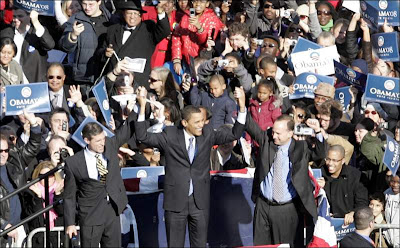
 It was the weekend before the 1960 election and my mother and I were patiently waiting in front of the tiny passenger terminal at the airport outside of
It was the weekend before the 1960 election and my mother and I were patiently waiting in front of the tiny passenger terminal at the airport outside of The moment that John F. Kennedy walked toward the crowd and held out his hand to me is indelible: His steely yet warm gaze, those incredible greenish-gray eyes, every hair on his head catching and reflecting the sun just right. Gleaming teeth. The kind of smile you would save for an old friend.
I wondered why he was alone. Where was Jackie? But the thought quickly passed as he grasped my hand and squeezed it ever so slightly. I expected his hand to feel rough and calloused, but in the instant we touched before he moved on down the fence line, it seemed soft and warm.
Barack Obama does that to people, too. He inspires, projecting the feeling that you are in the presence of greatness, that history is being made before your very eyes. That in a time that cries out for leadership and change, he will be able to deliver.
And so it was that 48 years after my close encounter with JFK my son and I stood amidst a crowd of 20,000 people (or about one in 45 Delawareans ) packed into and surrounding Wilmington's Rodney Square yesterday afternoon as Obama did his version of a fly-by two days before voters in Delaware and 21 other states cast their Super Tuesday ballots.
Obama, standing in the shadow of a statue of Caesar Rodney, the patriot who broke the deadlock over signing the Declaration of Independence after his famous (at least to Delaware schoolchildren) 80-mile ride through a thunderstorm from Dover to Philadelphia, invoked frequent references to hope and change and intimated that John McCain would be his opponent in the fall campaign.
In a barbed rejoinder to Hillary Clinton's charge that he is a naive hope-monger, Obama fired back, declaring:
"This is not blind ignorance. This is not ignorance of barriers that stand in the way. It's just the opposite. . . . Nothing worthwhile in this country has never happened unless somewhere someone had hopes."Obama also offered specifics on the shape of the domestic and foreign policies that he would push for as president in the course of a 45-minute address, a stump-speech makeover that is a result of criticism that he had been hiding behind generalities.
How, asks Rich:
"Did the fairy-tale prince from Camelot vanquish a field of heavyweights led by the longtime liberal warrior Hubert Humphrey?JFK speechwriter Richard Goodwin answers that question this way:
"It wasn't ideas. It certainly wasn’t experience. It wasn't even the charisma that Kennedy would show off in that fall's televised duels with Richard Nixon."
"He had to touch the secret fears and ambivalent longings of the American heart, divine and speak to the desires of a swiftly changing nation — his message grounded on his own intuition of some vague and spreading desire for national renewal."While I was still in my teens when JFK was taken from us a mere three years after I shook his hand, I had some vague inkling then and came to understand later after covering the first several of eight presidential campaigns as a reporter and editor that he also had something else -- plain old luck.
Kennedy's margin of victory over Nixon was razor thin and, some direhards still charge, because of vote manipulation mischief in Chicago that was not unlike the funny business in Florida that enabled George Bush to slink past Al Gore. Not incidentally, that probably was the last time Bush, who as president has been so bad and so reviled that he hasn't been able to make his own luck, got lucky.
I will cast my vote in the Delaware primary tomorrow for hope and change, but also for luck.
This is because Obama will need bucketsful of that precious commodity if he is to break even with Hillary Clinton in the delegate count in the big Super Tuesday states because she is better organized, has the party ties that accrued to Humphrey in 1960 and, after all, profers a message with its own appeal.
I had thought as recently as last September when the presidential campaigns were revving up that Obama, as some JFK detractors believed, could stand another four years of seasoning. But as I came to understand that Obama's message was resonating so deeply that his time is 2008, not 2012 or later.
Obama's time is indeed now -- at the end of a failed presidency in an America desperate for new direction. Nevertheless, I felt a twinge of sadness as I stood with my son and listened to his inspiring oratory because I also understand that the forces driving the status quo are putting their enormous clout behind Hillary Clinton, and no amount of hope and wishful thinking nor a candidate as dynamic as Obama can change that.
It was an inspiring afternoon, but I fear that in the end it just was a whistlestop on Barack Obama's quest for an impossible dream.
No comments:
Post a Comment